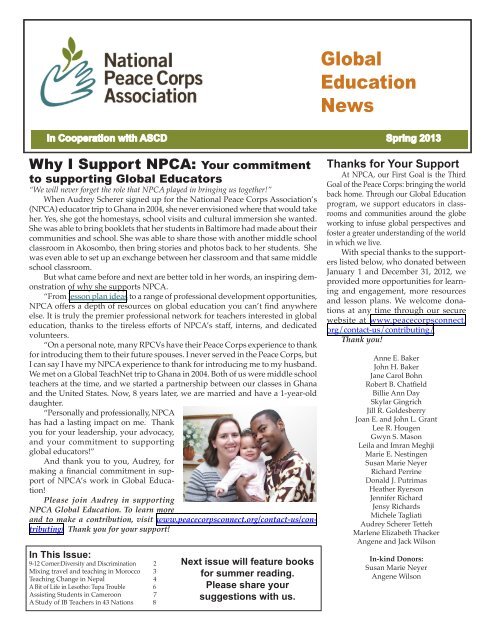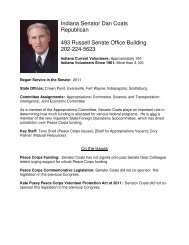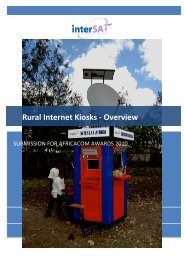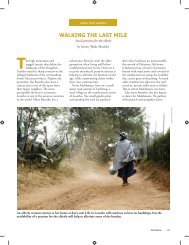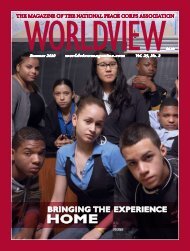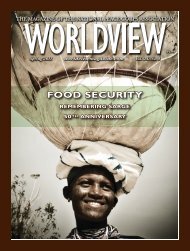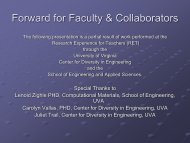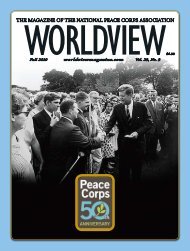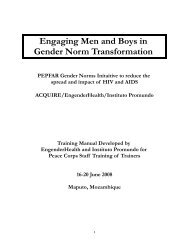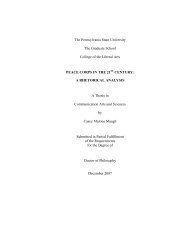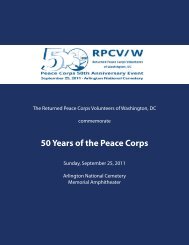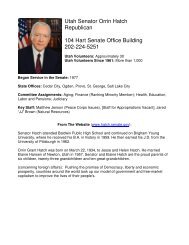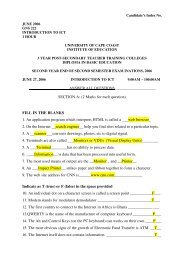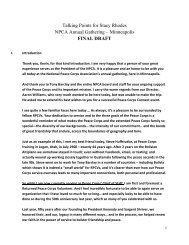Spring - National Peace Corps Association
Spring - National Peace Corps Association
Spring - National Peace Corps Association
Create successful ePaper yourself
Turn your PDF publications into a flip-book with our unique Google optimized e-Paper software.
Global<br />
Education<br />
News<br />
In Cooperation with ASCD <strong>Spring</strong> 2013<br />
Why I Support NPCA: Your commitment<br />
to supporting Global Educators<br />
“We will never forget the role that NPCA played in bringing us together!”<br />
When Audrey Scherer signed up for the <strong>National</strong> <strong>Peace</strong> <strong>Corps</strong> <strong>Association</strong>’s<br />
(NPCA) educator trip to Ghana in 2004, she never envisioned where that would take<br />
her. Yes, she got the homestays, school visits and cultural immersion she wanted.<br />
She was able to bring booklets that her students in Baltimore had made about their<br />
communities and school. She was able to share those with another middle school<br />
classroom in Akosombo, then bring stories and photos back to her students. She<br />
was even able to set up an exchange between her classroom and that same middle<br />
school classroom.<br />
But what came before and next are better told in her words, an inspiring demonstration<br />
of why she supports NPCA.<br />
“From lesson plan ideas to a range of professional development opportunities,<br />
NPCA offers a depth of resources on global education you can’t find anywhere<br />
else. It is truly the premier professional network for teachers interested in global<br />
education, thanks to the tireless efforts of NPCA’s staff, interns, and dedicated<br />
volunteers.<br />
“On a personal note, many RPCVs have their <strong>Peace</strong> <strong>Corps</strong> experience to thank<br />
for introducing them to their future spouses. I never served in the <strong>Peace</strong> <strong>Corps</strong>, but<br />
I can say I have my NPCA experience to thank for introducing me to my husband.<br />
We met on a Global TeachNet trip to Ghana in 2004. Both of us were middle school<br />
teachers at the time, and we started a partnership between our classes in Ghana<br />
and the United States. Now, 8 years later, we are married and have a 1-year-old<br />
daughter.<br />
“Personally and professionally, NPCA<br />
has had a lasting impact on me. Thank<br />
you for your leadership, your advocacy,<br />
and your commitment to supporting<br />
global educators!”<br />
And thank you to you, Audrey, for<br />
making a financial commitment in support<br />
of NPCA’s work in Global Education!<br />
Please join Audrey in supporting<br />
NPCA Global Education. To learn more<br />
and to make a contribution, visit www.peacecorpsconnect.org/contact-us/contributing/<br />
Thank you for your support!<br />
In This Issue:<br />
9-12 Corner:Diversity and Discrimination 2<br />
Mixing travel and teaching in Morocco 3<br />
Teaching Change in Nepal 4<br />
A Bit of Life in Lesotho: Tupa Trouble 6<br />
Assisting Students in Cameroon 7<br />
A Study of IB Teachers in 43 Nations 8<br />
Next issue will feature books<br />
for summer reading.<br />
Please share your<br />
suggestions with us.<br />
Thanks for Your Support<br />
At NPCA, our First Goal is the Third<br />
Goal of the <strong>Peace</strong> <strong>Corps</strong>: bringing the world<br />
back home. Through our Global Education<br />
program, we support educators in classrooms<br />
and communities around the globe<br />
working to infuse global perspectives and<br />
foster a greater understanding of the world<br />
in which we live.<br />
With special thanks to the supporters<br />
listed below, who donated between<br />
January 1 and December 31, 2012, we<br />
provided more opportunities for learning<br />
and engagement, more resources<br />
and lesson plans. We welcome donations<br />
at any time through our secure<br />
website at www.peacecorpsconnect.<br />
org/contact-us/contributing/<br />
Thank you!<br />
Anne E. Baker<br />
John H. Baker<br />
Jane Carol Bohn<br />
Robert B. Chatfield<br />
Billie Ann Day<br />
Skylar Gingrich<br />
Jill R. Goldesberry<br />
Joan E. and John L. Grant<br />
Lee R. Hougen<br />
Gwyn S. Mason<br />
Leila and Imran Meghji<br />
Marie E. Nestingen<br />
Susan Marie Neyer<br />
Richard Perrine<br />
Donald J. Putrimas<br />
Heather Ryerson<br />
Jennifer Richard<br />
Jensy Richards<br />
Michele Tagliati<br />
Audrey Scherer Tetteh<br />
Marlene Elizabeth Thacker<br />
Angene and Jack Wilson<br />
In-kind Donors:<br />
Susan Marie Neyer<br />
Angene Wilson
9-12 Corner: Diversity and Discrimination<br />
By Angene Wilson<br />
Anyone reading this newsletter probably agrees that the diversity of our nation and our world is a positive thing, but also realizes<br />
that discrimination occurs both in our country and around the world. The spring issue of WorldView magazine takes diversity as its<br />
theme. The articles offer an opportunity for teachers to engage students in learning about diversity and discrimination from a global<br />
perspective.<br />
I remember more than 25 years ago when I volunteered with an American youth exchange organization some American host families<br />
were surprised, even shocked, to discover that a German exchange student was black – had Ethiopian-German parents – and that a Dutch<br />
exchange student was brown – had Indonesian-Dutch parents. Of course, citizens of other countries have stereotypes of Americans as<br />
well. “You cannot be American,” a Chinese-American <strong>Peace</strong> <strong>Corps</strong> volunteer was told in Morocco. Serving while black in El Salvador<br />
was not easy for a <strong>Peace</strong> <strong>Corps</strong> volunteer. Navigating race in Benin was not easy for another African-American volunteer. An Indian-<br />
American volunteer was mistaken for a possible Pakistani spy in Ukraine. And how do gay volunteers deal with their identity overseas<br />
These are the topics of articles in the spring 2013 WorldView Magazine.<br />
The following lesson idea may fit in an English class in which writing a personal essay is a goal. A possibility in social studies,<br />
perhaps a psychology class, would be to use all the WorldView articles in the special section on diversity as resources.<br />
Objective:<br />
After reading the WorldView essay<br />
by Ravi Shah, write a two-page essay<br />
about an experience in which you or<br />
someone you know was discriminated<br />
against. Include the outcome of and<br />
reflections about the experience.<br />
Materials:<br />
WorldView article “Skin Deep” by<br />
Ravi Shah<br />
Procedure:<br />
Ask students to read Ravi Shah’s<br />
essay. In discussion of the essay, ask<br />
questions such as:<br />
• What is the challenge that is the<br />
focus of Ravi’s letter from the <strong>Peace</strong><br />
<strong>Corps</strong><br />
• How does Ravi begin to assuage his<br />
concerns<br />
• What are his other worries as a<br />
Californian moving to Ukraine<br />
• How did his Ukrainian host family<br />
make him feel welcome<br />
• What was his bad experience in the<br />
capital city of Kiev<br />
• What was the prejudice of his new<br />
host family at what was to be his<br />
permanent site<br />
• What was the happy ending<br />
• How and why might Ravi’s story<br />
have turned out differently<br />
Also discuss how Ravi puts together his<br />
essay to keep the reader interested as he<br />
describes the two instances of prejudice<br />
because of the color of his skin and the<br />
condition of his skin. Finally, ask students<br />
to write their own essay.<br />
Reminder to English<br />
Teachers:<br />
You will find wonderful essays and<br />
stories and lesson plans at peacecorps.<br />
gov in the publications Voices from the<br />
Field and Uncommon Journeys, available<br />
in pdf form. For example, the last<br />
of 11 essays in Uncommon Journeys is<br />
“Mr. John and the Day of Knowledge”<br />
about the first day of teaching English<br />
in Ukraine. Both publications aim to<br />
broaden students’ perspectives and<br />
inspire students to respond to the texts<br />
and create original narratives. Among<br />
my favorite essays in Voices from the<br />
Field – and I have even used these with<br />
undergraduate and graduate students<br />
-- are “Magic Pablo,” “Cross-Cultural<br />
Dialogue,” and “A Single Lucid Moment.”<br />
HREA Distance Learning Programme: Upcoming e-learning courses<br />
This a reminder about HREA’s e-learning courses offered in early 2013. These e-learning courses are generally six weeks in duration<br />
and involve approximately 30 hours of reading, interaction with participants and instructor(s) on discussion boards, webinars, quizzes<br />
and other assignments. Discounted tuition rates apply if you register and pay 4 or 8 weeks befor the course start. The following courses<br />
will be offered in April-May 2013:<br />
Gender-based Violence (3 April-14 May 2013)<br />
NEW! - La Programmation axée sur des droits de<br />
l’enfant (3 avril-18 juin 2013)<br />
Monitoring Children’s Rights (3 April-18 June<br />
2013)<br />
Forced Migration (10 April-21 May 2013)<br />
NEW! - Health and Human Rights (10 April-21<br />
May 2013)<br />
Human Rights, Sexual Orientation and Gender<br />
Identity (10 April-21 May 2013)<br />
NEW! - Monitoring & Evaluation in the NGO<br />
Sector (10 April-21 May 2013)<br />
Project Development and Management in the<br />
NGO Sector (10 April-4 June 2013)<br />
- Human Rights Advocacy (10 April-25 June<br />
2013)<br />
- Armed Conflict, Human Rights and Humanitarian<br />
Law (17 April-28 May 2013)<br />
- Genocide: What Role for International Law<br />
(17 April-28 May 2013)<br />
- Human Trafficking and Smuggling (17 April-28<br />
May 2013)<br />
NEW! - Monitoring Women’s Rights (17 April-28<br />
May 2013)<br />
For further information about each course please click on the course link above. Please note that we no longer have registration<br />
deadlines. Instead we offer early registration discounts up to 25% of the full tuition rate.<br />
For an overview of all courses, please visit www.hrea.org/courses.<br />
2 Global Education News, <strong>Spring</strong> 2013 www.peacecorpsconnect.org
Mixing travel and teaching in Morocco by Amy Cohen<br />
In October I was part of a group of educators from St<br />
Louis, Missouri that travelled to Morocco to participate in<br />
a unique professional development opportunity. Through<br />
Maryville University’s certification program in Global Awareness<br />
and Civic Education (GACE) I was partnered with a<br />
school in Casablanca, Morocco. The GACE program helped<br />
me incorporate 21 st century skills and cross cultural collaboration<br />
to improve student learning.<br />
I was one of the first American teachers allowed to teach<br />
in Moroccan schools and it was quite an experience. We were<br />
greeted with media and were given grand receptions at each<br />
of the six schools we visited. In some ways, it reminded me<br />
of teaching while in the <strong>Peace</strong> <strong>Corps</strong>; crowded classes with<br />
little resources yet the students were eager to learn from<br />
very dedicated teachers. Though students seemed to know<br />
a lot about American culture, they had a range of questions<br />
for us; everything from, “Is college expensive” to “What<br />
is Prom like” to “Why isn’t Arabic taught in our schools”<br />
Our delegation also met with Ministry of Education officials<br />
as well as staff from the US Embassy. I taught a lesson on endangered<br />
animals to students at Charif Al Idrissi high school<br />
in an English language class.<br />
Upon returning to Parkway West high school, my zoology<br />
classes designed advertisements on endangered animals and<br />
then wrote letters to government officials asking for their support<br />
on conservation laws. The classes from two continents<br />
used various forms of technology to communicate with each<br />
other to get a better understanding of global issues and their<br />
role as citizens. When I asked my students what they liked<br />
about the project one student responded, “It enables you to<br />
be more aware of what’s happening outside the US.” Another<br />
commented, “It’s an incredibly neat opportunity to be able to<br />
communicate with people from the other side of the world; to<br />
see how they perceive Americans and to learn their culture.”<br />
My goal is to develop an ongoing partnership where both<br />
students and teachers can use democratic citizenship as the<br />
basis for preparing globally educated students for the 21st<br />
century.<br />
This Prezi summarizes my teaching in Morocco as well<br />
as my student’s work in St. Louis:<br />
http://prezi.com/lui89reibftq/gace-program/auth_key=<br />
dbda27c784ccfc3d5e4a630d1726d3b9b121a48e&utm_<br />
source=em0shvwpr&utm_campaign=gro&utm_<br />
medium=email&<br />
amp;rc=ex0shvwpr<br />
This video showcases the professional work we did in<br />
Morocco as well as some of the history and culture we experienced<br />
while travelling around the country:<br />
http://www.youtube.com/watchv=EbP5ikt5cU8<br />
Amy Cohen with her partner teacher<br />
Saida Adnane<br />
Moroccan students learning<br />
about endangered animals<br />
Reception at Charif Al Idrissi high school<br />
www.peacecorpsconnect.org<br />
Global Education News, <strong>Spring</strong> 2013<br />
3
Teaching Change in Nepal: Nepal Teacher Training Innovations (NTTI)<br />
By Ashley Hager<br />
I first came to Nepal in 2008 as a volunteer<br />
teacher trainer for a local NGO<br />
and, though I had prepared myself for<br />
the poverty and daily inconveniences<br />
of life in Nepal, including water shortages,<br />
12- 16 hour power outages, pollution<br />
and traffic congestion, I was not<br />
prepared for the situation in Nepal’s<br />
classrooms. Even in the majority of<br />
private English-medium schools, 40+<br />
students are crammed on to densely<br />
packed benches in dark, dank classrooms.<br />
Teachers typically read their<br />
lessons verbatim from text books and<br />
call on students to stand and repeat<br />
facts from the text. A majority of teachers<br />
believe that fear is the most effective<br />
way to motivate students, so physical<br />
punishment and public humiliation are<br />
prevalent in Nepal’s classrooms. Even<br />
if students learn to read and write, they<br />
do not learn how to question what they<br />
learn or how to problem solve, leaving<br />
them unprepared for the challenges and<br />
opportunities they face in their own<br />
lives, or for the kind of leadership their<br />
country needs as it transitions from a<br />
monarchy to a democracy.<br />
I arrived in Nepal during a period<br />
of optimism. The Maoist insurgency<br />
had ended and the monarchy had been<br />
replaced with a newly elected constituent<br />
assembly (CA) charged with writing<br />
a constitution for the world’s newest<br />
republic. Everyone was talking about<br />
“Naya (new) Nepal” and everything<br />
seemed possible. Four years later the<br />
CA has been dissolved, Nepal still does<br />
not have a constitution, corruption has<br />
skyrocketed, and Nepal is considered at<br />
risk of becoming “a failed state.”<br />
One theory for why democracy has<br />
failed to thrive is that Nepal’s people do<br />
not know how to participate effectively<br />
in the democratic process. When I asked<br />
a group of teachers about the solutions<br />
they would propose to solve some of<br />
Nepal’s most intransigent problems,<br />
the responses I got were: “That’s the<br />
government’s problem“ and “Nepal<br />
needs more foreign aid.” A legacy of<br />
monarchy and a rigid caste system have<br />
made Nepalese dependent on authority<br />
and fatalistic about the role they can<br />
play in forging their country’s future.<br />
I founded Nepal Teacher Training<br />
Innovations (NTTI) to encourage greater<br />
levels of critical and creative thinking<br />
and problem solving in Nepal’s classrooms—skills<br />
students need to fulfill<br />
their own potential and skills required<br />
of a new generation of enlightened leaders<br />
capable of making fading hopes for<br />
Naya Nepal a reality. NTTI trains teachers<br />
to use inquiry-based techniques to<br />
encourage deeper thinking, as opposed<br />
to memorization, and to create nurturing,<br />
dynamic, and interactive learning<br />
environments where students feel safe<br />
enough to express their ideas and grow<br />
intellectually.<br />
Since 2010, NTTI has trained more<br />
than 1000 teachers from some of the most<br />
remote and under resourced parts of the<br />
country. Because each teacher typically<br />
works with 80 students over the year,<br />
our program has reached more than<br />
80,000 students. Preliminary analysis of<br />
pre and post-training classroom observation<br />
data reveals that NTTI-trained<br />
teachers improve by 61 % as a direct result<br />
of their participation in NTTI trainings.<br />
NTTI-trained teachers’ classrooms<br />
are lively, interactive hubs for learning<br />
where children, and especially girls, are<br />
eagerly raising their hands and asking<br />
questions that demonstrate new levels<br />
of curiosity and innovative thinking.<br />
Here is what one student said about her<br />
NTTI-trained teacher:<br />
Since my teacher went to this training,<br />
my classes have been more interesting.<br />
Before, my teachers used to lecture all the<br />
time and it was hard to give<br />
all my attention. Now my<br />
teacher asks us to say what<br />
we think and she let us<br />
work with partners.<br />
Also, my teacher<br />
stopped beating us when<br />
we make a mistake. This is<br />
good for me because I was<br />
very scared of the stick so I<br />
never raised my hand. I am<br />
coming to school every day<br />
now and I am understanding<br />
the work better. *Rita<br />
Shrestha, Grade 4<br />
The NTTI training model is unique<br />
in Nepal in that the emphasis is on<br />
teaching methodology rather than<br />
content. Nepali teachers are typically<br />
knowledgeable about their subject matter<br />
but often unable to effectively<br />
communicate what they know to their<br />
students or to assess whether students<br />
understand what has been taught. NTTI<br />
teaches teachers how to present information<br />
in multiple modalities (auditory,<br />
visual, and tactile/kinesthetic), to ask<br />
open ended questions to encourage<br />
critical thinking, to facilitate collaborative<br />
learning opportunities, to focus on<br />
practical application of newly learned<br />
skills, and to motivate students using<br />
positive encouragement rather than the<br />
stick.<br />
NTTI is also the only teacher training<br />
model in Nepal to provide intensive<br />
post-training follow-up teacher support.<br />
Master Trainers conduct demonstration<br />
classes at school sites to give teachers<br />
an opportunity to observe how to<br />
implement best teaching strategies in<br />
an actual classroom context and every<br />
NTTI-trained teacher is observed in the<br />
classroom and participates in an individual<br />
feedback session with an NTTI<br />
Master Trainer. 96 percent of the teachers<br />
we work with say this is the first time<br />
they have been observed and received<br />
feedback on their practice. They tell<br />
us that this follow up support is what<br />
gives them the confidence to use what<br />
they learn from the training in their own<br />
classrooms.<br />
See Teaching Change, page 5<br />
4 Global Education News, <strong>Spring</strong> 2013 www.peacecorpsconnect.org
Teaching Change, cont. from page 4<br />
NTTI also builds local capacity by<br />
training Mentor Teachers who provide<br />
on-going support to teachers at their<br />
school sites and who serve as sources<br />
of inspiration to their colleagues. Principals<br />
tell us that the Mentor Teachers<br />
create a new momentum for positive<br />
change at their schools as teachers,<br />
who previously were not open to being<br />
observed, are requesting feedback from<br />
Mentor Teachers and expressing an<br />
interest in becoming Mentor Teachers<br />
themselves.<br />
NTTI has a particular emphasis on<br />
female empowerment and motivating<br />
girls to stay in school, as only 20% of<br />
girls in rural public schools graduate<br />
from high school. We provide Girls’ Sensitivity<br />
Trainings to make teachers more<br />
aware of the unique needs of female students.<br />
For example, because village girls<br />
told us they often skip school while they<br />
are menstruating because of the lack of<br />
privacy, NTTI works with another local<br />
NGO to install locks on bathroom doors<br />
in schools.<br />
Because we work in communities<br />
with especially high rates of attrition,<br />
child marriage and trafficking of girls,<br />
NTTI conducts Girls’ Empowerment<br />
Workshops to raise the awareness of<br />
village girls about health, safety, and<br />
the importance of staying in school.<br />
Thanks to a generous grant from Dining<br />
for Women (DfW), NTTI will be<br />
offering empowerment workshops to<br />
more than 400 girls annually. NTTI<br />
trainings are proving an effective forum<br />
for female teachers to prove themselves<br />
the intellectual equals of their male colleagues<br />
and providing opportunities<br />
for talented female teachers to become<br />
Mentor Teachers and Master Trainers,<br />
who serve as role models for girls and<br />
agents of change in their schools and<br />
communities.<br />
“My experience as an NTTI trainer<br />
has opened up my world and given me<br />
confidence I never imagined I would have,<br />
especially in dealing with male teachers.”<br />
*Sumati Shakya, NTTI Master Trainer<br />
If you would like to learn more<br />
about NTTI, please visit our website<br />
www.nepaltti.org and if you would like<br />
to help us move our mission forward,<br />
please contact Ashley Hager, NTTI Project<br />
Director, at a.hager@nepaltti.org<br />
Food Tank, Heifer, Oxfam, RESULTS, Why Hunger and World<br />
Savvy Join KIDS to Form an Alliance<br />
By Jane and Larry Levine<br />
This year marks the 19 th year of the Kids<br />
Can Make A Difference® (KIDS) program and<br />
the third year of our association with iEARN.<br />
Since its inception as a program of Why-<br />
Hunger, KIDS has enjoyed steady growth<br />
and maturity. Upon becoming a program of<br />
iEARN, the reach of KIDS has grown both in<br />
the United States and worldwide through the<br />
Finding Solutions to Hunger Project (FSH).<br />
We feel that the time has come for teachers<br />
and students to use the KIDS Teacher guide,<br />
Finding Solutions To Hunger, as a launching<br />
pad into a wider association with the leading<br />
nonprofit hunger and poverty organizations.<br />
As FSH is structured presently, teachers and<br />
students develop their own projects demonstrating<br />
what they have learned and putting<br />
that knowledge to work to help alleviate the scourge of hunger and poverty in their<br />
community and world. While we feel that the present approach is good, there is an<br />
enhancement that is beneficial for the students and educators involved in FSH.<br />
We believe that we need to enlist the experts in the field of hunger and poverty<br />
to become involved in helping educators understand that there are ways for<br />
them to join ongoing projects that go beyond what the teacher guide offers. We<br />
understand the time restraints that teachers currently face and feel that having a<br />
ready-made menu of projects available to them is a logical next step for KIDS and<br />
FSH.<br />
We took our concept to six of the leading hunger and poverty organizations;<br />
Food Tank, Heifer, Oxfam, RESULTS, WhyHunger and World Savvy and invited<br />
them to join us as the Founding Members of this alliance. We are delighted that<br />
all of them enthusiastically embraced the initiative and now are an integral part<br />
of the project. Our plan is to enlarge the number of organizations participating in<br />
this alliance as we move forward.<br />
With their support and blessing, we are happy to unveil a new addition to<br />
the KIDS website called Suggested Actions. Each of the Founding Members has<br />
a “personal page” that describes ongoing projects that are available for students<br />
and teachers to use as extensions of their classroom work. These projects offer a<br />
diversity of ways that students can follow to make a difference in their community<br />
and world. They also will have the opportunity to dialog with the various experts<br />
in the field. These suggested actions will be updated as the need arises and reflect<br />
the most current initiatives undertaken by the alliance members.<br />
If you want to learn more or about becoming part of the Suggested Actions<br />
initiative and/or are interested in become active in FSH, please contact Larry at<br />
g. We welcome all who want to become part of the<br />
solution. All who join will receive a free download version of the KIDS 255 page<br />
Teacher Guide.<br />
Jane Finn Levine EdD and Larry Levine are Co-founders and Directors of Kids Can<br />
Make A Difference® and may be contacted at kids@kidscanmakeadifference.org.<br />
www.peacecorpsconnect.org<br />
Global Education News, <strong>Spring</strong> 2013<br />
5
A Bit of Life in Lesotho: Tupa Trouble<br />
By Zoé Schroeder, Current Education PCV in Lesotho (2012-14) zoeschroeder@gmail.com<br />
As I wait for school to start (originally<br />
opening on Jan. 14 th and now<br />
Jan. 28 th ), I am encountering the many<br />
“ups and downs” that <strong>Peace</strong> <strong>Corps</strong> has<br />
prepared me for. This has to do with<br />
the 3 month time period when you first<br />
arrive at site and you might experience<br />
loneliness, missing home, too much<br />
attention from your community, not<br />
enough attention from your community<br />
and daily frustrations at mundane tasks<br />
that suddenly become difficult. For your<br />
reading pleasure, I will break down one<br />
of my daily frustrations.<br />
Enter ‘tupa’. It is not a person, but<br />
one heck of an annoying piece of wood.<br />
That is right. Piece. Of. Wood. Here’s the<br />
scene: My community relies on a well to<br />
get all of their water. It is located close<br />
to my house so I consider myself lucky.<br />
But, of course, it is broken. There is a<br />
part missing that applies pressure when<br />
you pump so that water is pushed up.<br />
It broke off about 2 years ago (or so my<br />
neighbors tell me) and has never been<br />
fixed. Therefore, the people of Tabola<br />
have replaced it with a large piece of<br />
wood that you place beneath the lever so<br />
that it can apply the necessary pressure.<br />
Everyone calls it “tupa” of “the stick” in<br />
Sesotho.<br />
Up until about a week ago, the<br />
tupa and I had no problems. I pumped<br />
my water and carried it home like a<br />
good Masotho. Yet, one day I arrived<br />
and discovered no tupa. No tupa, no<br />
water. I stared blankly at the pump for<br />
a couple minutes and I am sure people<br />
were watching and laughing, as they<br />
always do. I eventually made my way<br />
to the nearest house to ask where it was,<br />
and saw another tupa on the ground. In<br />
broken Sesotho, some English and a lot<br />
of hand gestures, I got the impression<br />
that most people have their own tupa.<br />
She let me borrow hers and I successfully<br />
pumped my water for the day. I<br />
was suddenly worried about where I<br />
was going to find my own tupa. You<br />
might say “find the nearest tree,” but<br />
that would not be helpful because I<br />
cannot see a single tree in my site for<br />
miles.<br />
Luckily, my host family has their<br />
own tupa which they usually leave at<br />
the pump for others to use if need be.<br />
But as of late, the tupa has been used<br />
too much and has worn out. The wood<br />
has smoothened out so that it does not<br />
grip the lever well and slips easily. Also,<br />
there is less water now that we are in<br />
mid-summer so you have to pump a lot<br />
harder and faster than usual. After about<br />
10 minutes of heavy pumping, putting<br />
the tupa back 30 times already and I<br />
have yet to see a trickle of water fill my<br />
20 liter bucket, I am ready to throw the<br />
tupa into the bush in South Africa.<br />
Although I struggle with the tupa to<br />
this day, this story has a happy ending.<br />
I get so angry at the pump I have to tell<br />
myself to calm down. I knew I would<br />
not have the modern conveniences here<br />
that I am used to in the US. So why be<br />
mad The past 3 or 4 times I have been at<br />
the pump, something truly remarkable<br />
has happened. Someone has come out<br />
to help me. The other day, it was a boy<br />
who could not have been much older<br />
than 8. While I am ready to burst into<br />
tears at the situation, my neighbors take<br />
on the tupa with such patience. When<br />
it falls, they calmly put it back. They<br />
might laugh at me and my crazy American<br />
ways every day, but they see me as<br />
part of their community. The fact that I<br />
actually go to the tap myself and pump<br />
my own water is a sign that I really am<br />
serious about living here, with them. So<br />
they help me out just like they would<br />
help out anyone in Tabola. It is a very<br />
generous act and I am always touched<br />
when it happens. I can only hope that<br />
after my <strong>Peace</strong> <strong>Corps</strong> service I will have<br />
the patience of an African.<br />
Photo taken by Zoé Schroeder on Jan 14 th<br />
2013 in Tabola, Lesotho.<br />
iEARN International Conference<br />
The 20th Annual iEARN International<br />
Conference and 17th Annual<br />
Youth Summit 2013 will be held in Doha,<br />
Qatar from July 1st to July 6th, 2013.<br />
All global educators are welcome!<br />
We invite you to join hundreds<br />
of educators, students, administrators<br />
and partner organizations who come together<br />
annually from 50-70 countries at<br />
the iEARN Conference and Youth Summit<br />
to share how they are using technology<br />
to build global understanding and<br />
enhance teaching and learning! Make<br />
global connections, share best practices<br />
in online collaborative project-based<br />
learning. Have a project to share<br />
Theme of Conference<br />
The theme of the conference will<br />
focus on the use of technologies in education<br />
to reach out, learn and build a<br />
better world together. The conference<br />
will cover topics such as environment,<br />
cultural diversity and the use of Information<br />
and Communication Technologies<br />
in the classroom. Educators and<br />
students will be able to attend plenary<br />
sessions, deliver or attend a variety<br />
of workshops to further develop their<br />
knowledge and skills, share experiences,<br />
discover innovative ways to use ICTs,<br />
and connect with their peers across the<br />
world.<br />
ROTA & iEARN-Qatar<br />
Reach Out To Asia (ROTA) is the<br />
official representative of the iEARN program<br />
in Qatar. iEARN-Qatar provides<br />
opportunities for students and teachers<br />
to collaborate through the network with<br />
other iEARN communities around the<br />
world. Educators have the opportunity<br />
to join the ROTA Knowledge Network<br />
and benefit from professional development<br />
to further develop their professional<br />
skills and implement meaningful<br />
online projects supporting their teaching.<br />
Since its launch in 2008, the program<br />
has reached 99 schools, 411 teachers<br />
have been trained and 1,442 students<br />
have actively participated in projects.<br />
Register at: http://www.iearn2013.<br />
org/<br />
6 Global Education News, <strong>Spring</strong> 2013 www.peacecorpsconnect.org
Assisting Students in Cameroon with Education<br />
By Pavla Zakova-Laney, RPCV Cameroon 1996-1999<br />
Ever since I was a young teenager<br />
growing up in the former Czechoslovakia<br />
(now Czech Republic), I have<br />
wanted to help others. After I moved to<br />
the United States and met a <strong>Peace</strong> <strong>Corps</strong><br />
volunteer who was going to Mauritania<br />
in 1989, I became very interested in joining<br />
the <strong>Peace</strong> <strong>Corps</strong>. However, at that<br />
time I could hardly speak or understand<br />
English and I was far from being an<br />
American citizen. I had left Czechoslovakia<br />
in 1986. I was ready in 1994 when<br />
I finished classes at Wellesley College as<br />
a Davis Scholar and was sworn in as an<br />
American citizen on July 21 st . It was then<br />
that I applied to join the <strong>Peace</strong> <strong>Corps</strong> and<br />
was accepted.<br />
I was invited to serve as a science<br />
teacher in Cameroon. I never thought<br />
I could teach because I used to be extremely<br />
shy and thought I was stupid<br />
and ugly. My heart sank, but then I realized<br />
that unless I tried I would never<br />
know if I could do it and maybe I would<br />
enjoy it. I loved it!<br />
I taught biology at a secondary<br />
school in the Northwest Region of Cameroon<br />
from 1996 to 1999. I found out<br />
that many students did not have even<br />
very basic things such as pens, pencils,<br />
exercise books, textbooks, money for<br />
school fees, uniforms, shoes and other<br />
essentials, so I began to personally assist<br />
them as much as possible. I soon<br />
realized that I could not take care of the<br />
many needs of hundreds of eager and<br />
grateful students.<br />
There was no science laboratory or<br />
equipment for teaching biology, no water<br />
or electricity, so I took many students<br />
on excursions. First to a waterfall, about<br />
25 minutes from school, then to a tea<br />
factory and tea plantations in a neighboring<br />
village, a beautiful Lake Oku,<br />
Bamendjing reservoir and, during my<br />
last year, I took my class of 34 students<br />
all the way down to the Atlantic Ocean,<br />
Limbe botanical garden, Wildlife Center,<br />
an oil refinery and of course to Douala,<br />
the largest seaport in Cameroon. It was<br />
at the time when the Mount Cameroon<br />
was erupting. My students were so<br />
happy and it made me very happy,<br />
too.<br />
I d i d n o t<br />
want to leave<br />
the students but<br />
my husband had<br />
been waiting<br />
for me for three<br />
years (I had met<br />
him during my<br />
internship in Oregon<br />
in 1995 and<br />
we were married<br />
in 1998 in Tatum,<br />
Cameroon), so I<br />
joined him in Albany,<br />
Oregon in<br />
November 1999.<br />
He suggested<br />
that I should<br />
start a nonprofit<br />
group so that we could continue to assist<br />
more students. That was all I could think<br />
of after I returned from Cameroon.<br />
I went back in May 2000 with 18<br />
boxes of various donations and in September<br />
we finally got our Tax exempt<br />
status. Now Educare-Africa is a 501 (c) (3)<br />
charitable nonprofit organization dedicated<br />
to improving living and learning<br />
conditions of students in Cameroon. I<br />
am a full-time volunteer president and<br />
executive director working from our<br />
home. Once a year I travel to Cameroon<br />
to assist the students and schools<br />
personally.<br />
Anyone interested could check out<br />
the blog for more information, photographs<br />
and video clips from my annual<br />
trips: http://educareafrica.blogspot.<br />
com/ .<br />
I am looking for another volunteer<br />
who is interested in working with me<br />
in whatever way he/she could so that<br />
we could assist more outstanding needy<br />
students. If you feel inspired, please,<br />
email me at: pavlazl@comcast.net .<br />
Pavla Zakova-Laney.<br />
www.peacecorpsconnect.org<br />
Global Education News, <strong>Spring</strong> 2013<br />
7
Developing Global Citizens: A Study of IB Teachers in<br />
43 Nations by Merry M. Merryfield, Professor Emeritus, The Ohio State University, merryfield.1@osu.edu<br />
How do teachers prepare their<br />
students to be citizens of the world<br />
Recently I worked with the International<br />
Baccalaureate (IB) in The Hague to examine<br />
what teachers in the IB Diploma<br />
Programme (secondary school level)<br />
are doing day to day to effect such outcomes.<br />
Through online focus groups,<br />
I and my research assistants—Tami<br />
Augustine, Jason Harshman, Carolyn<br />
Kaplan, and Melinda McClimans—led a<br />
series of two week long threaded discussions<br />
in English and Spanish with 126<br />
IB teachers.<br />
The online discussions addressed<br />
these questions: What does it mean to<br />
be a global citizen What are you doing<br />
day to day to prepare your students to<br />
think and act as citizens of the world<br />
Below are some of the overall findings<br />
and then I focus on one element that the<br />
teachers identified as foundational but<br />
rarely discussed in the global education<br />
literature.<br />
Findings<br />
Analysis of the 14,000 plus postings<br />
during the discussions revealed many<br />
themes and issues that are found in the<br />
global education literature. For example,<br />
there was agreement among most of the<br />
teachers that they:<br />
1. provide their students with personal<br />
cross-cultural and cross-national<br />
experiences with people of other<br />
cultures (through literature, work<br />
with local immigrants, migrants or<br />
refugees, online connections, and<br />
travel);<br />
2. model and promote values of respect,<br />
empathy and caring for those<br />
different from oneself;<br />
3. teach and have students practice<br />
skills in listening, inquiry, evaluation,<br />
analysis of conflicting points<br />
of view, and reflection;<br />
4. select content that is international<br />
in scope and provides opportunities<br />
to develop understanding of global<br />
interconnectedness, global issues<br />
and perspective consciousness;<br />
5. demonstrate how international<br />
mindedness deepens students’ understanding<br />
of their own culture,<br />
history and current issues facing<br />
their community and nation.<br />
However, the major finding that<br />
emerged in both quantity and quality<br />
of discussion is one that is rarely mentioned<br />
in the global education literature.<br />
Open-mindedness was the primary<br />
attribute that most of the teachers—no<br />
matter from what country— described<br />
as fundamental in developing globally<br />
knowledgeable and engaged students.<br />
Open-Mindedness<br />
The teachers perceive the development<br />
of open-mindedness as a complex<br />
process that is both foundational (needs<br />
to be sequenced from Pre-K on up) and<br />
central unifying skill across the curriculum.<br />
According to the teachers, it is<br />
critical in literature and culture learning<br />
and in learning about global issues<br />
and world events. It is foundational<br />
in developing habits of the mind such<br />
as the ability to empathize, anticipate<br />
complexity, overcome stereotypes and<br />
recognize one’s own interconnectedness<br />
with people, global issues and global<br />
change.<br />
The teachers used many phrases to<br />
capture the centrality of open-mindedness<br />
in their teaching. It was described<br />
as the cornerstone of learning about<br />
the world and its peoples because it<br />
allows students to think beyond their<br />
own cultural norms and consider the<br />
perspectives and experiences of people<br />
different from themselves, a process that<br />
is critical to understanding the world.<br />
Open-mindedness was identified as the<br />
major building block, a central skill, and<br />
the foundation that allows for understanding<br />
the world’s peoples and issues.<br />
It allows students to get beyond local<br />
norms and perspectives and consider<br />
those of others without prejudice.<br />
So what does the term actually<br />
mean to the teachers The words most<br />
frequently used to describe openmindedness<br />
place an emphasis on a<br />
willingness to listen to, consider, think<br />
about, or learn about ideas, norms of<br />
behavior, and experiences different<br />
from one’s own without assuming that<br />
differences are negative. Others place<br />
curiosity about the world and its people<br />
and motivation to engage beyond their<br />
comfort zone as key components in<br />
open-mindedness.<br />
Within the IB Learner Profile,<br />
open-mindedness is one of the values<br />
that IB learners strive to develop.<br />
Open-mindedness is measured by the<br />
extent to which students “understand<br />
and appreciate their own cultures and<br />
personal histories, and are open to the<br />
perspectives, values and traditions of<br />
other individuals and communities.<br />
They are accustomed to seeking and<br />
evaluating a range of points of view, and<br />
are willing to grow from the experience”<br />
(http://www.ibo.org/programmes/<br />
profile/). We see these emphases echoed<br />
throughout the conversations between<br />
IB teachers.<br />
According to teachers, open-mindedness<br />
has to come first in the process of<br />
developing global citizens. A teacher in<br />
the United States commented: “Firstly,<br />
one has to be open-minded and try to rid<br />
themselves of any preconceptions or prejudices<br />
toward one or more cultural groups.<br />
I believe this is essential to thinking globally.”<br />
An IB music teacher in China emphasized<br />
that open-mindedness was<br />
used to lay groundwork to examine<br />
prejudices and beliefs about cultural<br />
groups different than one’s own in order<br />
to experience their music without<br />
preconceived ideas.<br />
One teacher in India stated: “Across<br />
the age groups, teaching needs to be aligned<br />
with the understanding of cultural context<br />
and open-minded attitudes among students.<br />
A necessary skill that enables and makes<br />
students’ aware of happenings around him/<br />
her.”<br />
The essential nature of open-mindedness<br />
in developing global citizens<br />
is so complete that the teachers found<br />
it difficult to think of a global citizen<br />
without having open-mindedness as a<br />
habit of mind. “I think a global citizen is<br />
an open-minded person,” noted a teacher<br />
in Mexico.<br />
A teacher in the United States went<br />
one step further to show us how class-<br />
8 Global Education News, <strong>Spring</strong> 2013 www.peacecorpsconnect.org
oom practice can assist teachers in<br />
developing open-mindedness with all<br />
of the complexity that accompanies it:<br />
I’m inclined to think that being global is<br />
an authentic openness to the truth in all of<br />
its complexity and uncertainty...I emphasize<br />
this because I would like to suggest that<br />
other equally valid answers to this question<br />
are in a sense means towards this ends.<br />
In other words, studying other cultures,<br />
traveling, participation in international<br />
celebrations, service work, etc. are all valuable<br />
experiences which lead to this ‘authentic<br />
openness,’ which I’d like to suggest is at the<br />
heart of ‘being global.’<br />
In their classrooms many teachers<br />
support open-mindedness by discussing<br />
global issues which are perceived as a<br />
key component in developing global<br />
citizenship. <strong>National</strong>ism was one global<br />
issue that surfaced numerous times in<br />
the discussions. When using nationalism<br />
as a topic of study, an IB teacher in<br />
New Zealand pointed out that every<br />
country has its own interpretations of<br />
history related to heritage, culture, and<br />
politics. To achieve student understanding<br />
of nationalism, this teacher uses<br />
schoolbooks from various countries<br />
to examine how historical events are<br />
presented quite differently around the<br />
world. The teacher believes that students<br />
can develop a more open mind<br />
by studying how nationalist feelings<br />
can influence the storytelling around<br />
historical events in all countries .<br />
This finding on the centrality of<br />
open-mindedness is significant as most<br />
other studies have found that global<br />
content is given primary attention.<br />
Open-mindedness is not a single skill,<br />
however. Attitudes and values such as<br />
empathy, listening, respect, and care<br />
were mentioned as critical in developing<br />
global citizens.<br />
If the IB teachers are right and openmindedness<br />
is a critical foundation in<br />
being able to learn about the world—<br />
other cultures, global events, issues and<br />
problems—without the colored glasses<br />
of our own biases, then we need to think<br />
about its place in the curriculum and in<br />
teacher education programs.<br />
Note: The teachers were nominated by an<br />
administrator as exemplary global educators.<br />
Then the study was explained to them<br />
via email from the IB leadership in The<br />
Hague and the teachers’ permission was<br />
obtained. They were divided into eight discussion<br />
groups with one in Spanish and the<br />
others in English. After preliminary email<br />
introducing ourselves and the process, we<br />
ran each discussion group for two weeks.<br />
Threads were developed by the researchers<br />
on the major questions as well as a thread for<br />
introductions and bios and another thread<br />
for examples of pedagogy that included lessons,<br />
projects, experiences, etc. We also had<br />
a teachers’ lounge forum for the teachers<br />
to ask questions, share resources, post fun<br />
photos and videos relevant to their work.<br />
The constant comparative method was used<br />
for data analysis.<br />
Join CONCERN’s 2013 Global Writing Competition and you can<br />
become a published author!<br />
Topics: Explore solutions to some of the world’s greatest development challenges<br />
in 750 – 1000 words:<br />
· Post a blog…on how you would end world hunger<br />
· Give a speech…accepting the Nobel <strong>Peace</strong> Prize for improving the lives of the<br />
world poorest people<br />
· Tell the story…of what it is like to live in Haiti three years after the devastating<br />
earthquake<br />
Categories: Junior (ages 13-15), Senior (ages 16-19), Adult (20 years or older)<br />
Prizes: Awarded in each of the categories as follows<br />
· First place: Laptop computer<br />
· Second place: E-reader<br />
· Third place: Mp4 player<br />
And becoming a published author in the annual Writing Competition Book!<br />
Deadline: Midnight, March 21 st , 2013<br />
For more information, visit gcc.concernusa.org/global-writing-competition/<br />
Doctoral Research on Global<br />
Education - Win a FREE iPad<br />
Mini!<br />
Dear Global Educator!<br />
I am a Ph.D. student in International<br />
Education Policy at the University of<br />
Maryland, College Park. The focus of<br />
my doctoral dissertation research is how<br />
teachers in the upper-elementary grade<br />
levels teach about the world and world<br />
issues to their students.<br />
I am asking active teachers in grades<br />
3, 4, and 5 to send me instructional materials<br />
they use to teach about world<br />
issues. This could include lesson or<br />
unit plans, reading materials such as<br />
children’s literature and basal readers,<br />
internet resources, digital media, etc.<br />
For example, what children’s literature<br />
do teachers select as read-alouds, what<br />
Internet sites do teachers ask students to<br />
visit, or what activities do teachers plan<br />
when they want to build bridges across<br />
cultures<br />
Submit your global education instructional<br />
materials by March 31, 2013<br />
to be entered to win a FREE iPad Mini!<br />
To take part in this research,<br />
please:<br />
• Go to the following website for a<br />
brief background questionnaire (5<br />
minutes): http://www.surveymonkey.com/s/Y26NRR8<br />
• Before completing the questionnaire,<br />
you will be asked to read<br />
and agree to the Informed Consent<br />
required by the Institutional Review<br />
Board of the University of Maryland,<br />
College Park.<br />
• Send via e-mail any lesson plans,<br />
unit plans, or instructional materials<br />
that you believe to be your most<br />
successful or best example of global<br />
education-related instructions to<br />
lisa_swayhoover@yahoo.com<br />
If materials cannot be e-mailed,<br />
please mail to the address below and<br />
I will compensate you for the cost of<br />
photocopying and postage:<br />
Lisa Swayhoover<br />
5709 39th Avenue<br />
Hyattsville, MD 20781<br />
Thank you for your assistance.<br />
Please do not hesitate to contact me if<br />
you have any questions. Feel free to<br />
share this with other global educators.<br />
www.peacecorpsconnect.org<br />
Global Education News, <strong>Spring</strong> 2013<br />
9
A Teacher Workshop in the Amazon, by Nancy Paul<br />
Most elementary teachers have read The Great Kapok Tree by Lynne Cherry or The<br />
Red-Eyed Tree Frog by Joy Cowley to their classes. And most Returned <strong>Peace</strong> <strong>Corps</strong><br />
Volunteers jump at the chance to travel when they can. I’m lucky to be an RPCV<br />
who is also a teacher and gets to travel every summer. While perusing NPCA’s<br />
Global Education News, I often saw an ad for a trip for teachers to go down to the<br />
Amazon in Peru and work with scientists and learn ways to bring the rain forest<br />
back to their classrooms. Last summer I finally went and met with teachers from<br />
all over the U.S. who ranged from kindergarten teachers to high school Spanish<br />
teachers.<br />
The experience was magical. At night I fell asleep to the rousing symphony<br />
of insects and frogs. In the early morning with mist rising off the river we went<br />
bird watching and saw birds representing every color of the rainbow. We walked<br />
on swinging bridges overlooking the green canopy, which was like looking over<br />
the ocean, going on for miles and miles and never ending. Most surprising to<br />
me, was that unlike the posters in my classroom that showed an abundance of<br />
animals gathered together, animals were difficult to find, and we wouldn’t have<br />
seen anything if it wasn’t for our expert guide Lucio, a Peruvian national. Instead<br />
we quietly followed him as he pointed out the amazing mimicry and camouflage<br />
abilities of the various insects, reptiles, and birds.<br />
We also had a community service project where we painted a school and got to meet villagers who lived along the river.<br />
Even though my former <strong>Peace</strong> <strong>Corps</strong> site was in the Marshall Islands thousands of miles away in the Pacific I pulled up a<br />
chair and felt right at home. People who once dressed in woven fibers from the trees were singing away and sharing food<br />
dressed in jeans and t-shirts that Americans had probably donated to the Salvation Army.<br />
If you decide to go it is worth stopping in Lima a day or two early to check out the museums and the restaurants for the<br />
tasty Peruvian cuisine. An optional extension tour of Machu Picchu is offered.<br />
The Educator Academy in Peru is again being offered July 2-11, 2013. For details go to www.amazonworkshops.com.<br />
Professional Development in<br />
Costa Rica<br />
Join 13 teachers from across the U.S.<br />
and discover how you can bringCosta<br />
Rica and the MDGs into your curriculum!<br />
We are accepting applications<br />
for a 5 week professional development<br />
program in Costa Rica this summer,<br />
June 14-July 19 (approximately). The<br />
theme of the program is “Teaching the<br />
United Nations’ Millennium Development<br />
Goals: Costa Rica.” Full-time K-12<br />
teachers in the social sciences, humanities<br />
and Spanish from across the U.S.<br />
are eligible to apply. Cost is $1,000 and<br />
covers round trip airfare from Detroit,<br />
lodging, meals, admission fees, transportation<br />
in Costa Rica. Sponsored by<br />
Michigan State University’s Center for<br />
Latin American and Caribbean Studies,<br />
the College of Education, and the<br />
Earth Charter International Secretariat<br />
in Costa Rica.<br />
Application deadline is March 11.<br />
For more information & an application:<br />
http://2013costarica.wordpress.com<br />
GEEO Summer Programs for Educators<br />
Global Exploration for Educators Organization (GEEO) is a 501c3 non-profit<br />
organization that runs summer professional development travel programs designed<br />
for teachers.<br />
GEEO is offering 23 different travel programs for the summer of 2013: India/<br />
Nepal, Italy, Portugal/Spain, Amalfi Coast, Eastern Europe, Budapest to Istanbul,<br />
Uzbekistan, Vietnam, Comfort Thailand, Thailand/Laos, Cambodia, China, Comfort<br />
China, Russia/Mongolia/China, Turkey 15 day, Turkey 8-Day, Kenya/Tanzania,<br />
South Africa/Mozambique/Zimbabwe/Botswana, Morocco, Peru, Ecuador,<br />
The Galapagos Islands and Costa Rica. The registration deadline is June 1st, but<br />
space is limited and many programs will be full well before the deadline.<br />
Educators have the option to earn graduate school credit and professional<br />
development credit while seeing the world. The trips are 8 to 24 days in length and<br />
are designed and discounted to be interesting and affordable for teachers. GEEO<br />
provides teachers educational materials and the structure to help them bring their<br />
experiences into the classroom. The trips are open to all nationalities of K-12 and<br />
university educators and administrators, as well as retired educators. Educators<br />
are also permitted to bring along a non-educator guest.<br />
Detailed information about each trip, including itineraries, costs, travel dates,<br />
and more can be found at www.geeo.org. GEEO can be reached 7 days a week, toll<br />
free at 1-877-600-0105 between 9AM-9PM EST.<br />
The travel programs featured on this page target teacher professional development<br />
and/or curriculum development. For an experience geared more towards<br />
hands-on service, educational programs and a close-up view of the impact of<br />
volunteer service, consider traveling with the <strong>National</strong> <strong>Peace</strong> <strong>Corps</strong> <strong>Association</strong>’s<br />
Next Step Travel. Learn more about this unique program at http://travel.<br />
peacecorpsconnect.org<br />
10 Global Education News, <strong>Spring</strong> 2013 www.peacecorpsconnect.org
A new COMPASS has just been<br />
published<br />
The 2012 version of COMPASS:<br />
Manual for Human Rights Education with<br />
Young People has just been published<br />
by the Council of Europe. The new,<br />
updated manual includes much of the<br />
material which made the 2002 edition<br />
so useful for facilitators of human rights<br />
education, but builds upon and expands<br />
this material to incorporate new issues<br />
such as disability and disablism,<br />
religion, remembrance, war and terrorism.<br />
Altogether, COMPASS users can<br />
now benefit from over 60 proposed<br />
activities for human rights education,<br />
as well as new and exciting ways of<br />
addressing human rights issues and<br />
values. For instance, Chapter 1 has been<br />
re-organised and addresses human<br />
rights education as a human right and<br />
considers the potential of the European<br />
Charter on Education for Democratic<br />
Citizenship and Human Rights Education<br />
to provide more possibilities for<br />
more scope and flexibility in human<br />
rights education. Some of the activities<br />
in the 2002 edition that were less used<br />
have been dropped.<br />
Altogether this results overall in<br />
a larger edition of COMPASS with<br />
more relevant, practical and useable<br />
activities. Compass has become a reference<br />
manual for many young people<br />
involved in value-based youth work<br />
and non-formal education. Available in<br />
more than 32 languages, in some states<br />
Compass has become an integral part<br />
of human rights education in schools<br />
and for many practitioners. The French<br />
and Russian versions are expected in<br />
the course of 2013. Guidelines for the<br />
translation into other languages can be<br />
sent to interested partners upon request.<br />
We hope that this new edition will be as<br />
widely disseminated as the first.<br />
COMPASS 2012 can be ordered from<br />
www.book.coe.int The 2002 edition<br />
remains available and downloadable at<br />
www.coe.int/compass<br />
Fulbright Canada Programs<br />
Fulbright Canada, part of the<br />
worldwide Fulbright Program, supports<br />
focused academic exchanges between<br />
Canada and the United States. Along<br />
with joining the prestigious Fulbright<br />
network, all of our grantees receive a<br />
cash award ($12,500 - $25,000), a health<br />
benefit plan, a three-day orientation in<br />
Ottawa, and can apply for our enrichment<br />
opportunities such as our mobility<br />
funding (up to $800) to participate in<br />
academic activities outside of their host<br />
region, our Alumni Internship Program,<br />
our Eco-Leadership Program and our<br />
Community Leadership Program.<br />
I would like to draw your attention<br />
to a number of specific opportunities for<br />
scholars. We are currently seeking applicants<br />
for our various research chairs,<br />
all valued at $25,000 for one semester.<br />
Fulbright Canada offers an outstanding<br />
43 different visiting research chairs<br />
which are available at 22 Canadian Institutions.<br />
Please visit the website with<br />
a catalogue of our awards:<br />
http://www.fulbright.ca/programs/<br />
american-scholars/visiting-chairsprogram.html<br />
These chairs offer an extraordinary<br />
opportunity to scholars seeking to do<br />
comparative research in a welcoming<br />
and engaging environment.<br />
We are also recruiting American<br />
scholars and students for our self-placed<br />
traditional awards that can be held at<br />
any institution across Canada. For more<br />
information about all of our awards,<br />
please visit our website at www.fulbright.ca.<br />
Please note that the deadline<br />
to apply for the 2014-15 academic year is<br />
August 1, 2013 for scholars and October<br />
17, 2013 for graduate students.<br />
I have attached the Fulbright Canada<br />
Winter Newsletter; page 7 has a list of<br />
our upcoming programs with competition<br />
opening and closing dates. Flyers<br />
can be downloaded here:<br />
• American Scholars: http://www.<br />
fulbright.ca/programs/americanscholars.html<br />
• American Students: http://www.<br />
fulbright.ca/programs/americanstudents.html<br />
For general information about our<br />
programs, please contact kinnes@fulbright.ca.<br />
If you have specific questions<br />
about the Fulbright Visiting Research<br />
Chairs, please contact Brad Hector,<br />
Program Officer at Fulbright Canada,<br />
at bhector@fulbright.ca.<br />
Sincerely,<br />
Kaitlyn Innes<br />
Program Officer, Recruitment,<br />
Outreach and Alumni Relations<br />
Reviewers sought<br />
We occasionally receive books or curriculum in the office that authors would<br />
like reviewed in this publication, so we are seeking reviewers. In exchange for<br />
writing a review, you get to keep the materials! Interested Send an email to<br />
globaled@peacecorpsconnect.org with your name, address, and a description of<br />
the grade level(s), subject area(s), and/or types of materials you would be interested<br />
in (e.g., books, curricula, online materials). We’ll follow up by email with a<br />
description if there is a match with what we have and, if so, send it along to you!<br />
Thank you!<br />
Join GlobalEdNews<br />
Get global education information hot off the wires! Sign up for the free global<br />
education monthly e-newsletter.<br />
You can subscribe by sending an email to globaled@peacecorpsconnect.orgwith<br />
your email address in the body of the message and “subscribe globalednews” in<br />
the subject line. Or go to www.peacecorpsconnect.org/resources/education/ and<br />
click on “subscribe.”<br />
www.peacecorpsconnect.org<br />
Global Education News, <strong>Spring</strong> 2013<br />
11
Bringing the World into the<br />
Classroom: New Strategies for<br />
Internationalizing Undergraduate<br />
Curricula<br />
Please join the Levin Institute on<br />
May 20, 2013 to share best practices and<br />
promote dialogue about curricular and<br />
co-curricular learning opportunities on<br />
themes of global workforce preparedness,<br />
globalization and global citizenship.<br />
The conference will highlight<br />
the achievements of the SUNY Global<br />
Workforce Project and new and related<br />
programs that strengthen campus internationalization.<br />
To learn more about the Bringing the<br />
World into the Classroom: New Strategies<br />
for Internationalizing Undergraduate Curricula<br />
conference, please visit: http://<br />
www.levin.suny.edu/gwpconference.<br />
cfm. Registration will begin mid-<br />
March.<br />
Korea Academy for Educators<br />
(KAFE): Explore Korean History,<br />
Culture, and Cuisine<br />
July 29 to August 2, 2013, at Korea Cultural<br />
Center in Los Angeles, CA.<br />
Learn about Korean history and culture<br />
from prominent<br />
scholars,<br />
and deepen your<br />
understanding of<br />
Korean American<br />
students and<br />
their families. Fellowship<br />
opportunities to cover travel,<br />
hotels, and meals available for out of<br />
town and state educators. Application<br />
deadline March 29.<br />
For more information and to apply,<br />
contact Daniel Lee (daniellee721@<br />
yahoo.com) or see www.koreaacademy.<br />
org<br />
This newsletter is distributed electronically and posted to the NPCA website. New<br />
email Please log in to our database to update your record. Go to www.peacecorpsconnect.<br />
org/membership and click on “login to your account.”<br />
If you do not know your password, use the automated “forgotten your password” link<br />
or email membership@peacecorpsconnect.org.<br />
Global<br />
Education<br />
News<br />
<strong>National</strong> <strong>Peace</strong> <strong>Corps</strong> <strong>Association</strong><br />
1900 L Street, NW, Suite 610<br />
Washington, DC 20036-5002<br />
www.globalteachnet.org<br />
Global Education News is a quarterly teacher<br />
resource from the <strong>National</strong> <strong>Peace</strong> <strong>Corps</strong> <strong>Association</strong><br />
and the Professional Interest Community of ASCD.<br />
We welcome your contributions. Opinions expressed<br />
in this publication are those of the authors, and do not<br />
necessarily reflect the official views of the NPCA or<br />
ASCD.<br />
Please send letters or material for the newsletter<br />
to Susan Neyer, Editor, 1701 Lilac Drive, Walnut<br />
Creek, CA 94595 (925-933-4490) e-mail: Susan-<br />
Neyer@astound.net or Anne Baker, NPCA 1900<br />
L Street, NW, Suite 610, Washington, DC 20036-<br />
5002 (202) 293-7728, ext. 12, e-mail: globaled@<br />
peacecorpsconnect.org.<br />
Next deadline: May 15 for<br />
June-July-August Issue<br />
Membership/Renewal Form<br />
To join/renew NPCA’s Global Education, or make a donation, please go to peacecorpsconnect.org or<br />
complete this form, clip it out, and send it to:<br />
Global Education, NPCA, 1900 L Street NW, Suite 610, Washington, DC 20036<br />
phone: (202) 293-7728, ext. 12 fax: (202) 293-7554 e-mail: globaled@peacecorpsconnect.org<br />
_____ I would like to join/renew NPCA at $35/year (includes Global Education) and these member groups at $15 each/year:<br />
(_________________________________________________________________ )<br />
_____ I want to help keep Global Education going strong. I’m including a donation of $ ______<br />
Name: __________________________________________________<br />
Address: ________________________________________________<br />
_________________________________________________<br />
Phone:_________________________________<br />
E-mail: ________________________________<br />
____ Please sign me up for the Global Ed News<br />
Grade/Subject if a teacher: __________________ School: ______________________________________________________<br />
I am a member of these education associations: ___ ASCD ___ NCSS ____ Other: ______________________<br />
___ My check made out to NPCA/Global Ed. is enclosed or Please charge $_____ to my ___ MC ___ VISA ___AmEx<br />
Card number ___________________________________________________ Expiration Date: ______________<br />
Signature ____________________________________________________________________<br />
12 Global Education News, <strong>Spring</strong> 2013 www.peacecorpsconnect.org


